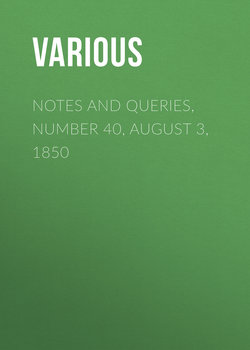Читать книгу Notes and Queries, Number 40, August 3, 1850 - Various - Страница 2
NOTES
DEDICATION TO MILTON BY ANTONIO MALATESTI
ОглавлениеDr. Todd, in his Life of Milton, ed. 1826, mentions the accidental discovery of a manuscript by Antonio Malatesti, bearing the following title:
"La Tina Equivoci Rusticali di Antonio Malatesti, c[=o]posti nella sua Villa di Taiano il Settembre dell' Anno 1637. Sonetti Cinqu[=a]nta. Dedicati al' III'mo Signore et Padrone Oss'mo Signor Giovanni Milton, Nobil' Inghilese."
It seems that this MS. had been presented, together with Milton's works, to the Academy della Crusca, by Mr. Brand Hollis, but had by some chance again found its way to England, and was sold by auction at Evans's some short time before Mr. Todd published this second edition of Milton's Life.
I know not if there has been any further notice of this MS., which is interesting as a monument of the respect and attention our great poet received from the most distinguished literary men of Italy at the time of his visit, and I should be glad if any of your correspondents can indicate its existence, and the place where it is now preserved. When it was on sale, I had permission to copy the title and a few of the sonnets, which were such as we could not imagine would have given pleasure to the chaste mind of Milton; each of them containing, as the title indicates, an équivoque, which would bear an obscene sense, yet very ingeniously wrapped up. The first sonnet opens thus:—
"Queste Sonnetti, o Tina, ch' i' hó composto,
Me gl' há dettati una Musa buffona,
Cantando d' improviso, alla Carlona,
Sul suono, spinto dal oalor del Mosto."
The second may serve to show the nature of the équivoque:—
"Tina, I' so legger bene, e rilevato
La Storia di Liombrune, e Josafatte,
Se ben, per esser noto in queste fratte
Sotto il Maestro mai non sono stato.
"E il lere del dificio m' ha giurato,
Quand' egli ha visto le Poesie ch' i' hó fatte,
Ch' elle son belle, e i piedi in terra batte,
E vuol ch' io mi sia in Pisa adottorato.
"Io canto, quand' io son ben ben satollo,
Sul Chitarrin con voce si sottile,
Ch'io ne disgrado insien Maestro Apollo.
"Vien un poco da me, Tina gentile,
Che s' egli avvien che tu mi segga in collo,
M' sentirai ben tosto alzar lo stile."
Antonio Malatesti was a man of mark in his time, being distinguished for his talent as an improvisatore. Among his friends were Galileo, Coltellini, and Valerio Chimentelli, who have all commendatory poems prefixed to Malatesti's "Sphinx," a collection of poetical enigmas, which has been frequently reprinted. Beside his poetical talent, he studied astronomy, probably under Galileo; and painting, in which he was a pupil of Lorenzo Lippi, author of the "Malmantile Raqquistato," who thus designates him under his academical name of Amostante Latoni (canto i. stanza 61.):—
"E General di tutta questa Mandra
Amostante Laton Poeta insigne.
Canta improviso, come un Calandra:
Stampa gli Enigmi, 'Strologia, e Dipigne."
Malatesti was a member of the Academy degli Apatisti, of which Milton's friends Coltellini and Carlo Dati had been the principal founders. The house of the latter was a court of the Muses, and it was at the evening parties there that all who were distinguished for science or literature assembled: "Era in Firenze la sua Casa la Magione de' Letterati, particolarmente Oltramontani, da lui ricevuti in essa, e trattati con ogni sorta di gentilezza."1 Heinsius, Menage, Chapelain, and other distinguished foreigners were members of this academy; and it is more than probable that, were its annals consulted, our poet's name would also be found there.
S.W. SINGER.
Mickleham, July 15, 1850.
1
Salvino Salvini Fasti Consolari dell' Academia Fiorentina, 1717, p. 548. Milton's stay of two months at Florence must have been to him a period of pure enjoyment, and seems to have been always remembered with delight:—"Illa in urbe, quam prae ceteris propter elegantiam cum linguæ tum ingeniorum semper colui, ad duos circiter menses substiti; illie multorum et nobilium sanè et doctorum hominum familiaritatem statim contraxi; quorum etiam privatas academias (qui mos illie cum ad literas humaniores assiduè frequentavi). Tui enim Jacobe Gaddi, Carole Dati, Frescobalde, Cultelline, Bonmatthaei, Chimentille Francine, aliorumque plurium memoriam apud me semper gratam atque jucundam, nulla dies delebit."—Defensio Secunda, p. 96., ed. 1698.
